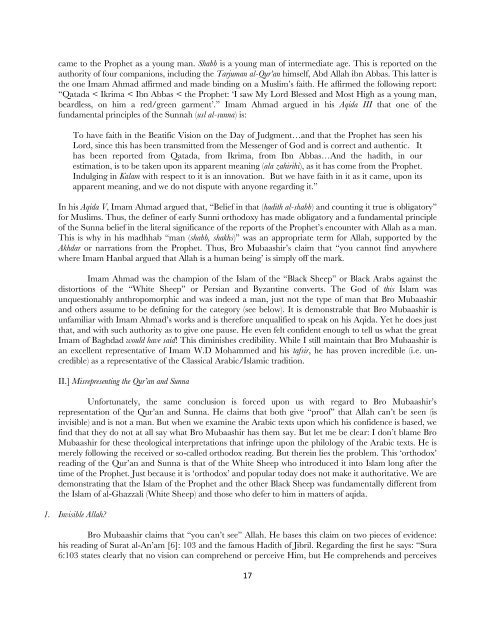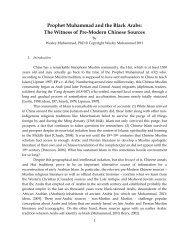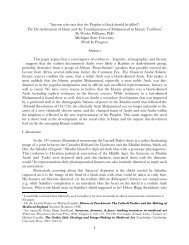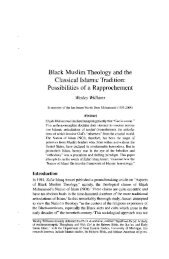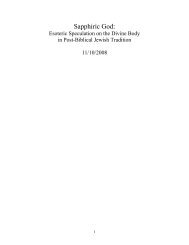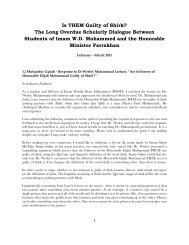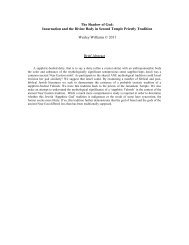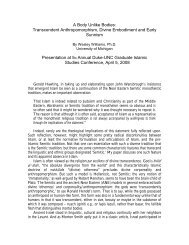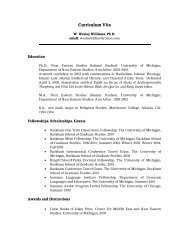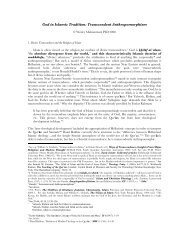Is THEM Guilty of Shirk? - Dr. Wesley Muhammad
Is THEM Guilty of Shirk? - Dr. Wesley Muhammad
Is THEM Guilty of Shirk? - Dr. Wesley Muhammad
Create successful ePaper yourself
Turn your PDF publications into a flip-book with our unique Google optimized e-Paper software.
came to the Prophet as a young man. Shabb is a young man <strong>of</strong> intermediate age. This is reported on the<br />
authority <strong>of</strong> four companions, including the Tarjuman al-Qur‟an himself, Abd Allah ibn Abbas. This latter is<br />
the one Imam Ahmad affirmed and made binding on a Muslim‘s faith. He affirmed the following report:<br />
―Qatada < Ikrima < Ibn Abbas < the Prophet: ‗I saw My Lord Blessed and Most High as a young man,<br />
beardless, on him a red/green garment‘.‖ Imam Ahmad argued in his Aqida III that one <strong>of</strong> the<br />
fundamental principles <strong>of</strong> the Sunnah (usl al-sunna) is:<br />
To have faith in the Beatific Vision on the Day <strong>of</strong> Judgment…and that the Prophet has seen his<br />
Lord, since this has been transmitted from the Messenger <strong>of</strong> God and is correct and authentic. It<br />
has been reported from Qatada, from Ikrima, from Ibn Abbas…And the hadith, in our<br />
estimation, is to be taken upon its apparent meaning (ala zahirihi), as it has come from the Prophet.<br />
Indulging in Kalam with respect to it is an innovation. But we have faith in it as it came, upon its<br />
apparent meaning, and we do not dispute with anyone regarding it.‖<br />
In his Aqida V, Imam Ahmad argued that, ―Belief in that (hadith al-shabb) and counting it true is obligatory‖<br />
for Muslims. Thus, the definer <strong>of</strong> early Sunni orthodoxy has made obligatory and a fundamental principle<br />
<strong>of</strong> the Sunna belief in the literal significance <strong>of</strong> the reports <strong>of</strong> the Prophet‘s encounter with Allah as a man.<br />
This is why in his madhhab ―man (shabb, shakhs)‖ was an appropriate term for Allah, supported by the<br />
Akhdar or narrations from the Prophet. Thus, Bro Mubaashir‘s claim that ―you cannot find anywhere<br />
where Imam Hanbal argued that Allah is a human being‘ is simply <strong>of</strong>f the mark.<br />
Imam Ahmad was the champion <strong>of</strong> the <strong>Is</strong>lam <strong>of</strong> the ―Black Sheep‖ or Black Arabs against the<br />
distortions <strong>of</strong> the ―White Sheep‖ or Persian and Byzantine converts. The God <strong>of</strong> this <strong>Is</strong>lam was<br />
unquestionably anthropomorphic and was indeed a man, just not the type <strong>of</strong> man that Bro Mubaashir<br />
and others assume to be defining for the category (see below). It is demonstrable that Bro Mubaashir is<br />
unfamiliar with Imam Ahmad‘s works and is therefore unqualified to speak on his Aqida. Yet he does just<br />
that, and with such authority as to give one pause. He even felt confident enough to tell us what the great<br />
Imam <strong>of</strong> Baghdad would have said! This diminishes credibility. While I still maintain that Bro Mubaashir is<br />
an excellent representative <strong>of</strong> Imam W.D Mohammed and his tafsir, he has proven incredible (i.e. uncredible)<br />
as a representative <strong>of</strong> the Classical Arabic/<strong>Is</strong>lamic tradition.<br />
II.] Misrepresenting the Qur‟an and Sunna<br />
Unfortunately, the same conclusion is forced upon us with regard to Bro Mubaashir‘s<br />
representation <strong>of</strong> the Qur‘an and Sunna. He claims that both give ―pro<strong>of</strong>‖ that Allah can‘t be seen (is<br />
invisible) and is not a man. But when we examine the Arabic texts upon which his confidence is based, we<br />
find that they do not at all say what Bro Mubaashir has them say. But let me be clear: I don‘t blame Bro<br />
Mubaashir for these theological interpretations that infringe upon the philology <strong>of</strong> the Arabic texts. He is<br />
merely following the received or so-called orthodox reading. But therein lies the problem. This ‗orthodox‘<br />
reading <strong>of</strong> the Qur‘an and Sunna is that <strong>of</strong> the White Sheep who introduced it into <strong>Is</strong>lam long after the<br />
time <strong>of</strong> the Prophet. Just because it is ‗orthodox‘ and popular today does not make it authoritative. We are<br />
demonstrating that the <strong>Is</strong>lam <strong>of</strong> the Prophet and the other Black Sheep was fundamentally different from<br />
the <strong>Is</strong>lam <strong>of</strong> al-Ghazzali (White Sheep) and those who defer to him in matters <strong>of</strong> aqida.<br />
1. Invisible Allah?<br />
Bro Mubaashir claims that ―you can‘t see‖ Allah. He bases this claim on two pieces <strong>of</strong> evidence:<br />
his reading <strong>of</strong> Surat al-An‘am [6]: 103 and the famous Hadith <strong>of</strong> Jibril. Regarding the first he says: ―Sura<br />
6:103 states clearly that no vision can comprehend or perceive Him, but He comprehends and perceives<br />
17


